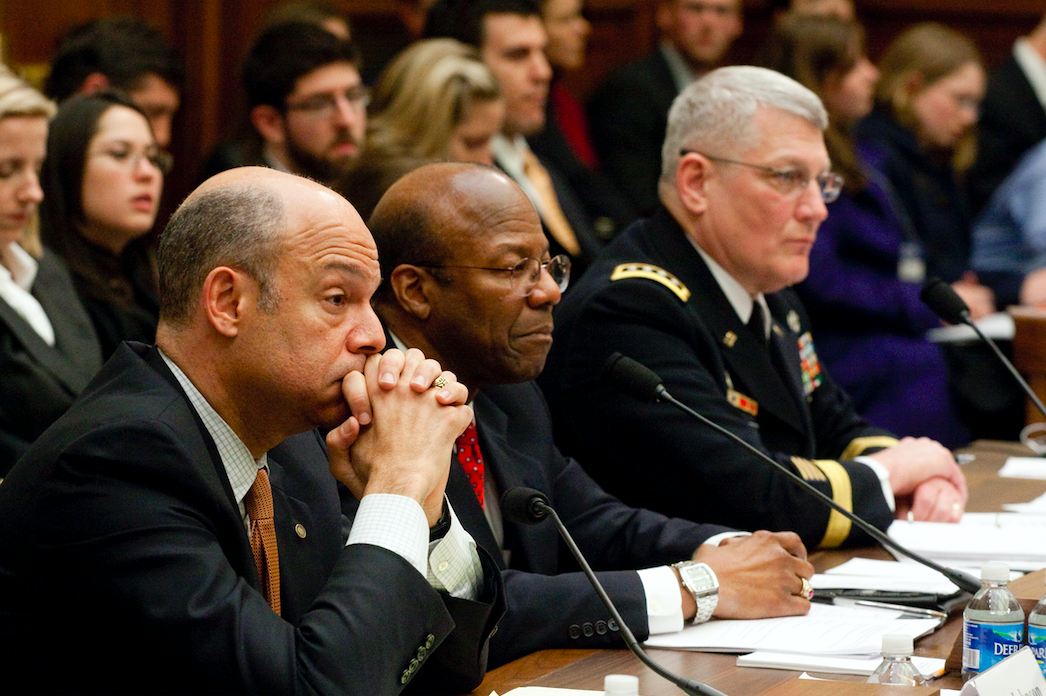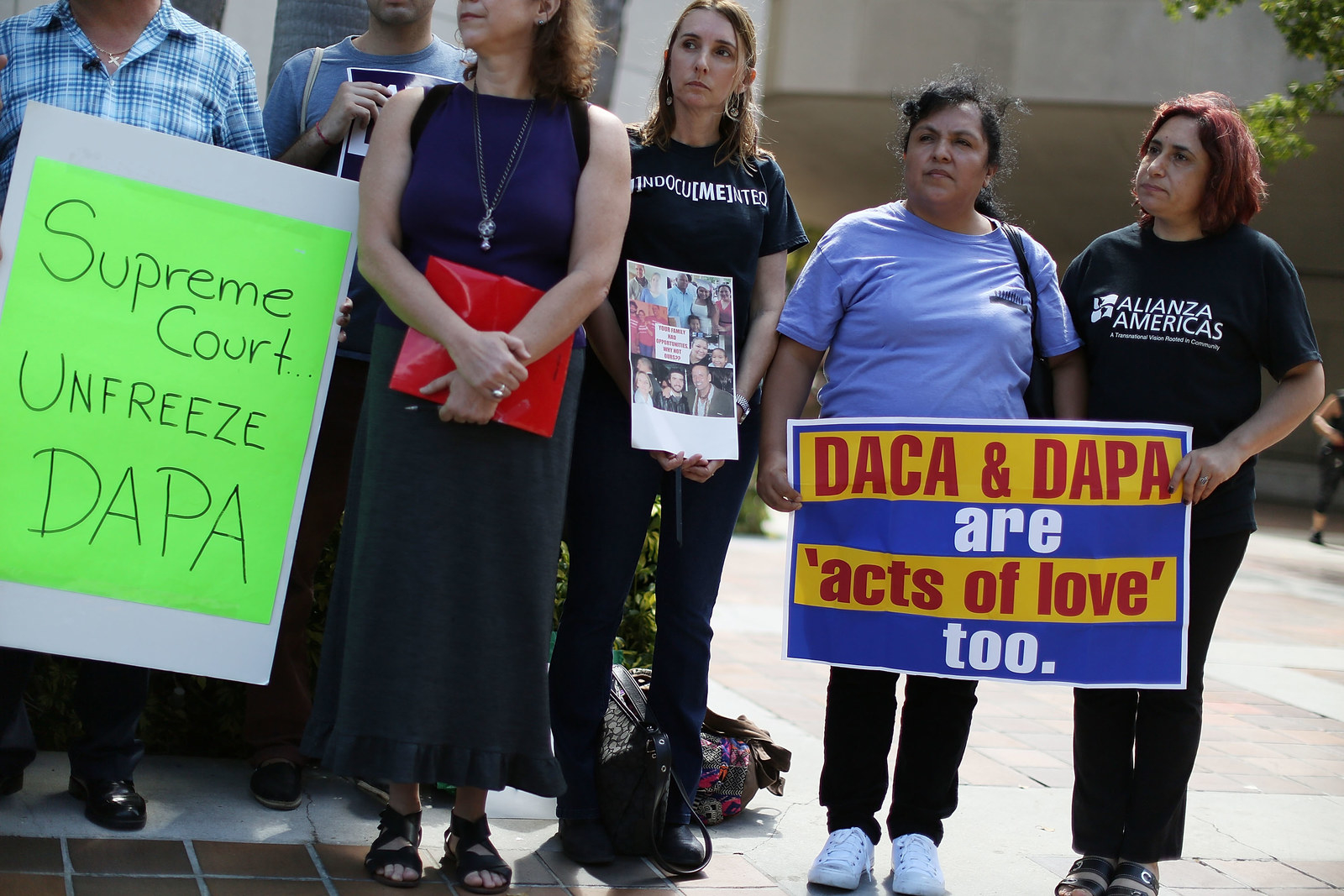
High-level lawyers are missing from top posts in the US government’s security agencies, leaving the Trump administration to navigate a series of domestic controversies and international crises without a full legal support system in place.
There are government lawyers filling in on an acting basis. But former officials who served in Republican and Democratic administrations say that it is critical to get political appointees confirmed — lawyers who are trusted by senior officials and empowered to defend the legality of the administration’s actions to the public and to foreign governments.
As US officials respond to escalating tensions with North Korea, American forces continue to fight in Syria, and President Trump pushes ahead with legally contested actions on immigration and transgender service in the military, the White House has been slow to nominate the top agency lawyers who advise officials on how they can lawfully respond to sensitive international and domestic security issues.
There are no Senate-confirmed lawyers leading the legal departments at the US Department of Defense, the US Department of State, the Office of the Director of National Intelligence, and the Department of Homeland Security. Under the Obama administration, these lawyers advised the president on the lawfulness of killing Osama bin Laden, helped craft policies to protect undocumented immigrants, and provided legal justification for Obama’s use of drone strikes.
The relationship between politically-appointed lawyers and senior officials “can’t be replicated by the career staff,” said Brian Egan, who served as State Department Legal Adviser during Obama’s final year in office.
“It could make a difference in anything from ... the political leadership having more comfort in having the political general counsel in a very difficult or sensitive meeting, to a general counsel’s ability to deliver difficult advice with the trust of the political leadership, to the general counsel having a little bit more leeway to push on the career staff on an issue where the there may be a policy desire to take an initiative that raises legal questions,” Egan said.
The White House has yet to announce nominees for general counsel at the Defense Department and the Office of the Director of National Intelligence. A Defense Department pick, John Sullivan, was announced in March, but was never submitted to the Senate and ended up in a senior position at the State Department. Trump announced a nominee for Homeland Security general counsel in April, John Mitnick, but the Senate did not receive that nomination until early August. The White House just announced a nominee for State Department Legal Adviser, Jennifer Newstead, on Sept. 1.
By this time in 2009, the Obama administration had lawyers confirmed in all four of these posts. The Department of Homeland Security and Office of the Director of Intelligence didn’t exist when President George W. Bush took office in 2001, but he had lawyers confirmed at the Defense Department and the State Department by mid-May.
The top agency lawyers advise administration official on what is lawful and what actions might trigger lawsuits, and they hash out questions of international law with their foreign government counterparts. In the weeks leading up to the May 2011 raid that killed bin Laden, for instance, the New York Times reported that four lawyers — including the Defense Department general counsel — were asked to secretly grapple with the legal questions raised by the operation, including whether the United States had to alert Pakistani officials in advance, the circumstances under which bin Laden could be killed, and whether he could be buried at sea.

After the White House announced the raid, the State Department Legal Adviser at the time, Harold Koh, became a prominent defender, writing and speaking publicly about why he believed it was lawful.
The exclusion of senior lawyers from decisionmaking can also raise concerns after the fact about the strength of any legal justification. Koh wasn’t involved in the legal analysis leading up to the bin Laden raid, according to the Times, and one of his predecessors, John Bellinger III, who served under President George W. Bush, questioned the exclusion in a 2015 blog post on Lawfare.
“Although the planned operation was understandably the government’s most closely guarded secret, the State Department Legal Adviser would have been best-positioned to advise on its consistency with international law and its impact on other countries,” Bellinger wrote.
The Trump administration reportedly did not involve Homeland Security officials, including lawyers, in the development of the president’s first travel ban in January — an executive order that was blocked by multiple federal judges across the country.
Behind in nominations
There are 21 agency general counsel positions that require Senate confirmation, plus the State Department Legal Adviser, according to the Congressional Research Service. The Trump administration is behind the Obama and W. Bush administrations in rolling out nominees for top legal jobs across the executive branch.
To date, four general counsel have been confirmed by the Senate, for Treasury, Veterans Affairs, Commerce, and the CIA. Of the 15 nominations that Trump has announced, 10 were submitted to the Senate after June 1.

As of September 2009, Obama had nominated 16 agency lawyers. All but one were submitted to the Senate before June 1. Obama submitted his nominee for Defense Department general counsel, Jeh Johnson — who later became Homeland Security secretary — before he was sworn into office.
The White House did not return a request for comment on the pace of lawyer nominations.
Bellinger told BuzzFeed News that he thought the delays were likely a combination of the administration being slow to get infrastructure in place to work on nominees after Trump won in November, potential nominees being hesitant to join the administration and needing time to be convinced, and the White House’s aversion to bringing on people who had criticized Trump. Bellinger was one of dozens of former national security officials, including lawyers, who signed a letter opposing Trump last year.
There are upsides to having career lawyers in these posts, Bellinger said. They have more experience than most political appointees, he said, and because they’ve been in the agencies for so long, they can function “without some of the friction that can sometimes happen when you have inexperienced or new or headstrong political appointees.”
However, he said, “the acting general counsels are going to be very cautious, they’re not going to exercise any new initiatives and they may not be as trusted by their department heads.”
"It's not going to work as well"
Agency lawyers serve dual functions — they’re responsible for the day-to-day internal legal needs of departments, such as managing contracts and working with the Justice Department when an agency is sued, as well as advising on policy and developing US legal positions in response to domestic and international crises.
The State Department Legal Adviser is one of seven lawyers who have participated in what’s known as the National Security Council “Lawyers’ Group,” which provides legal advice on national security matters to senior officials. Former officials told BuzzFeed News that the group has continued to meet during the Trump administration.
The group is chaired by the NSC legal adviser, who is not Senate-confirmed, and includes five Senate-confirmed lawyers — the State Department Legal Adviser, the general counsel of Defense, ODNI, and the CIA, and the head of the Justice Department’s Office of Legal Counsel — as well as the legal adviser to the chairman of the Joint Chiefs of Staff. Lower level lawyers sometimes participate in lieu of top officials.
Trump nominated Courtney Elwood as CIA general counsel in March, and she was confirmed in June. Trump nominated Steven Engel to lead the Office of Legal Counsel in February, and he was approved by the Senate Judiciary Committee in June, but has yet to get a vote in the full Senate.
At the Department of Homeland Security, the general counsel oversees the legal offices across the department, including the Federal Emergency Management Agency and the TSA. Immigration enforcement and policy — a priority for the Trump administration — are a major part of the top lawyer’s portfolio.

“Immigration issues tend to be pretty law-heavy. There’s a lot of litigation around it. The statutes and the regulations are very complicated and so there’s a lot of lawyer involvement,” said Steve Bunnell, who led the department’s legal office from 2013 until early 2017, as the Obama administration dealt with legal challenges to its efforts to expand protections for undocumented immigrants in the United States.
To the extent there’s disagreement among lawyers at US Customs and Border Protection, Immigration and Customs Enforcement, and US Citizenship and Immigration Services, the Homeland Security general counsel is the arbiter, Bunnell said.
Joe Whitley, who served as Homeland Security general counsel under President George W. Bush, said that career lawyers are going to be more “cautious” than political appointees in how they respond to and carry out policy directives from the administration.
“The government is not going to collapse without these people in these positions, but it's not going to work as well,” Whitley said.

